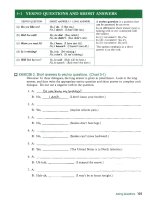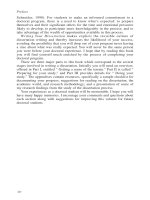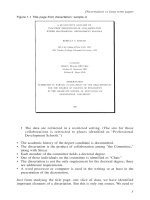Writing your doctoral dissertation - part 20 ppsx
Bạn đang xem bản rút gọn của tài liệu. Xem và tải ngay bản đầy đủ của tài liệu tại đây (50.38 KB, 5 trang )
Developing a productive setting
92
you will revise early drafts to reflect your new understanding. Rewriting is
an essential element in your dissertation work and all polished writing.
Your writing may take place at home, at your office, at the university, at a
library, or at a computer facility. Wherever you find yourself, make sure that
you always work on diskettes. And create multiple copies on diskettes or a zip
drive. Be cautious of saving on your hard drive. There seem to be mechanical
and human gremlins who play with these objects, and can potentially destroy
your work. Be in control of your work by being almost paranoid about it.
Always have multiple copies of each document. When giving work to your
committee for reaction, always keep a copy for yourself. When working on
text, frequently back up on additional diskettes and/or as hard copy. You cannot
back up too much! And then secure these copies in multiple sites.
The Other People in Your Life
While your dissertation will become a large part of your life, your home life
and your work life are important as well. Each setting needs attention, and
this adds to the pressures on doctoral students.
At Home
Home relationships become tense for many doctoral students. If you cannot
find ways to accommodate your responsibilities at home with the demands
of your doctoral program, you are likely to experience major angst. Spouses
may feel abandoned or intimidated while doctoral students typically look to
their families to support them through the tense times.
Hawley (1993) suggests, “As time-consuming as families are, they provide an
anchor in the crazy world of doctoral study. They are your link with reality” (p. 149).
Having a regular reality check is healthy for your soul, which you need to feed. You
don’t want to finish your degree and find you don’t care about anyone and no one
cares about you. Our lives are enriched by our friends and family. As you progress in
your dissertation work, be mindful of others’ feelings and find ways to include
significant others in your newly evolving world while you continue living in theirs.
Many doctoral students find ways to balance the conflicting worlds of home
and university by drawing on their spouse’s expertise in completing the
dissertation. Others share their checklists, documenting the numerous hurdles,
and collaborate on strategies to allocate time. Knowing how long this activity
will last is instrumental in obtaining cooperation and understanding. When the
time line is unclear, inordinate pressures come to bear on the relationship. The
non-student spouse or child, for example, may resent the seemingly unending
process. This annoyance may show itself in interesting ways. Marilyn told me,
“My husband taped a TV program over the data I collected at my school.”
Although she did not seem to interpret it as a malicious act, it might have been
an unconscious one since it has been repeated many times in other settings.
Developing a productive setting
93
Life goes on while you work on your dissertation. The draining of
finances, the straining of relationships, and the vague requirements for
completion contribute to untold tension. Margaret told me that she had the
“worst fight of my marriage” on the day of graduation. These are predictable
pressures which you must accommodate in some way. The entire process
becomes a constant struggle for many students.
At Work
Having a full-time job makes the process very frustrating because of the
constant disruption and interruption in the process.
Try to find some connections between your doctoral program and your job. It is
very possible that your work responsibilities will lead to the identification of your
research problem. Let your co-workers and your supervisors know if you are
“looking for a dissertation topic.” One person noted, “My job changed, and so
did my question.” Ask to be included in conversations where topics related to
your discipline are being discussed. When you are offered an opportunity to
accept additional responsibilities, you can view this from several stances, as:
• reward for good work;
• respect for your work;
• an obstacle to increase the burdens in your life;
• a predictable sign of progress in a project; or
• competition for the time needed to work on your dissertation.
You will need to make a judgment and determine your response. Don’t let
others set your agenda. Constantly consider your options and your priorities.
It is often advisable to take a short-term perspective, giving great energy to
completing your dissertation while expecting that you will subsequently be
in a mental and physical state to devote all of your energies and enthusiasm
for new projects. It is wonderful to have choices. Once you are done with
your dissertation, a whole new world of choices will open up to you. And so,
let’s get on to writing your proposal and completing your dissertation.
Notes
1 Quoted comments were provided by respondents to anonymous questionnaires,
interviews and focus group discussions with doctoral students and completers at
universities across the USA. For additional details about this study, see Appendix A.
2 Dissertations Abstracts International, a repository of most dissertations, is available in
most university reference libraries. Journals and professional handbooks provide
periodic summaries of recent dissertations. Review articles presented in journals, and
some edited books, synthesize recent developments in your field, frequently suggesting
future directions and recommendations for needed research.
97
10 Writing Your Dissertation Proposal
While Designing Your Dissertation
Research
I have changed…in so many ways. I feel so much more confident about what I
can do. I believe I can do almost anything!
Writing and defending a dissertation caused me to approach issues more critically.
(Quoted by Haworth, 1999, p. A13)
Writing your dissertation proposal prepares you for conducting your research
and subsequently writing your dissertation. A dissertation proposal typically
is comprised of several related sections. In many instances, the dissertation
proposal has a proscribed format, including several chapters. The content of
the proposal may include an explanation of the rationale for planning the
study and a design for conducting the study. In some institutions this can be
a relatively brief ten- to fifteen-page document, whereas in others it is
lengthy, averaging seventy-five pages.
Writing the proposal takes a significant amount of time since most
doctoral students are developing their ideas about their dissertation
concurrently with their writing a document in acceptable form for
institutional approval. Because the document includes components essential
in conducting the research study, you may use the format as a preliminary
outline for drafting plans for your research. Apprentice researchers typically
write each section of the proposal, intending to revise it, based on
professors’ feedback. In the process of moving from section to section, you
will refine your ideas, requiring your revision of earlier sections to present
a consistent perspective. The multiple drafts enable you to contemplate
important issues while becoming proficient at writing in the acceptable
genre for your institution. This chapter offers a great number of details
inherent in the writing of your dissertation proposal. From a “quick read”
you will get the gist of the chapter. Since there are numerous minute details
discussed, you will find it useful to return to each section as you progress
in your own proposal writing.
I will discuss the purposes for writing a dissertation proposal first, and
then proceed to discuss the content of the proposal, as well as typical steps
towards approval of your proposal. While there are probably unique
components to each institution’s process and proposal form, the guidelines
which follow are fairly representative of most program requirements.
Writing your dissertation proposal
98
Purposes for Writing a Dissertation Proposal
There are six major purposes accomplished by writing your dissertation
proposal. In writing it, you:
• identify your specific research focus;
• create a group of faculty scholars who will guide your research
apprenticeship;
• establish your research proficiencies;
• acquire proficiency in a writing style acceptable for your dissertation;
• draft early chapters of your dissertation;
• and prepare yourself for writing your dissertation.
Let’s consider these purposes.
Identify your specific research focus In order to write your dissertation, you
need a clear research agenda. Your research agenda is derived from your
depth of knowledge of your “field,” including your understanding of the
theories which are guiding your discipline and the directions in which your
discipline is moving. Your research typically either systematically tests one
aspect of a theory, or generates data towards theory-building where there is
no viable theory.
The dissertation research is intended to contribute to an on-going
professional discussion. In each discipline there are debates about important
issues. Your dissertation is intended to inform that dialog. Your dissertation
proposal is your opportunity to present an “argument” acknowledging
multiple perspectives while advancing a new perspective on the on-going
discussion. Your focused presentation is intended to convince your readers
that this proposed study is worthwhile doing and that you have the necessary
expertise to conduct the study.
Create a group of faculty scholars Faculty with expertise in areas germane to
your study direct your writing of your dissertation proposal. These professors
nurture your learning and evaluate your work, eventually deciding when they
believe it meets the university’s standards.
As you progress you will give evidence of understanding another
element in the dissertation process: your reliance on others. Some chairs
want their doctoral students to be “humble,” displaying their
dependency on their mentor for progress in their dissertations. Others
want students to be independent, utilizing all the resources available to
them without overburdening the chairs. In most instances, students need
to adopt multiple stances, depending on the stage they are at in the
dissertation process and the preferences of the members of their
committee.
Establish your research proficiencies Since most doctoral students have
limited experience in conducting research, particularly on dissertation scale,
Writing your dissertation proposal
99
the dissertation proposal serves to validate the doctoral student’s potential as
a researcher. From this perspective, then, your preparation of the proposal is
a quick immersion in research methodologies and problem finding.
Acquire proficiency in a writing style acceptable for your dissertation The
style of writing in dissertations is often disparagingly called dissertation-ese.
While this style is unique, it is not universally valued. Many universities are
more expansive in the styles which they accept. It is essential that you
demonstrate your writing proficiency in the genre (s) acceptable at your
university as part of the proposal writing process.
Draft early chapters of your dissertation It is not unusual for many parts of
the dissertation proposal to be included in your dissertation. Particularly in
settings where the proposal is quite lengthy, students incorporate large parts
of the proposal text in their dissertations.
Prepare yourself for writing your dissertation Once you have succeeded in
meeting the expectations for the dissertation proposal, you will have a clearer
idea of the form, content, and procedures for completing your dissertation.
In some respects you can view the proposal writing as a dry run for your
dissertation writing.
Writing the proposal is a major step on the road to getting done with your
dissertation. It provides students with the necessary tools for conducting
dissertation research while assuring the university that the student has the
appropriate knowledge and proficiencies for succeeding at this project.
Contents of the Dissertation Proposal
The dissertation proposal is a preliminary, scholarly document. It is
preliminary to your dissertation. It is scholarly in that it follows the style
guide adopted by a scholarly organization (e.g. the American Psychological
Association or the Modern Language Association) and it presents an
academic argument or position advancing your research as a potential
contribution to knowledge. Each word is carefully chosen to convey precisely
the intent of the writer. The organization clearly facilitates the reader’s
understanding of the major issues. The content impresses the academic
community with the writer’s breadth and depth of knowledge and with the
importance of the proposed study to advance knowledge or understanding of
a practice or a phenomenon.
The proposal typically contains four major components:
1 A descriptive title.
2 A statement of the research problem or question and the theoretical
concerns to be addressed.









